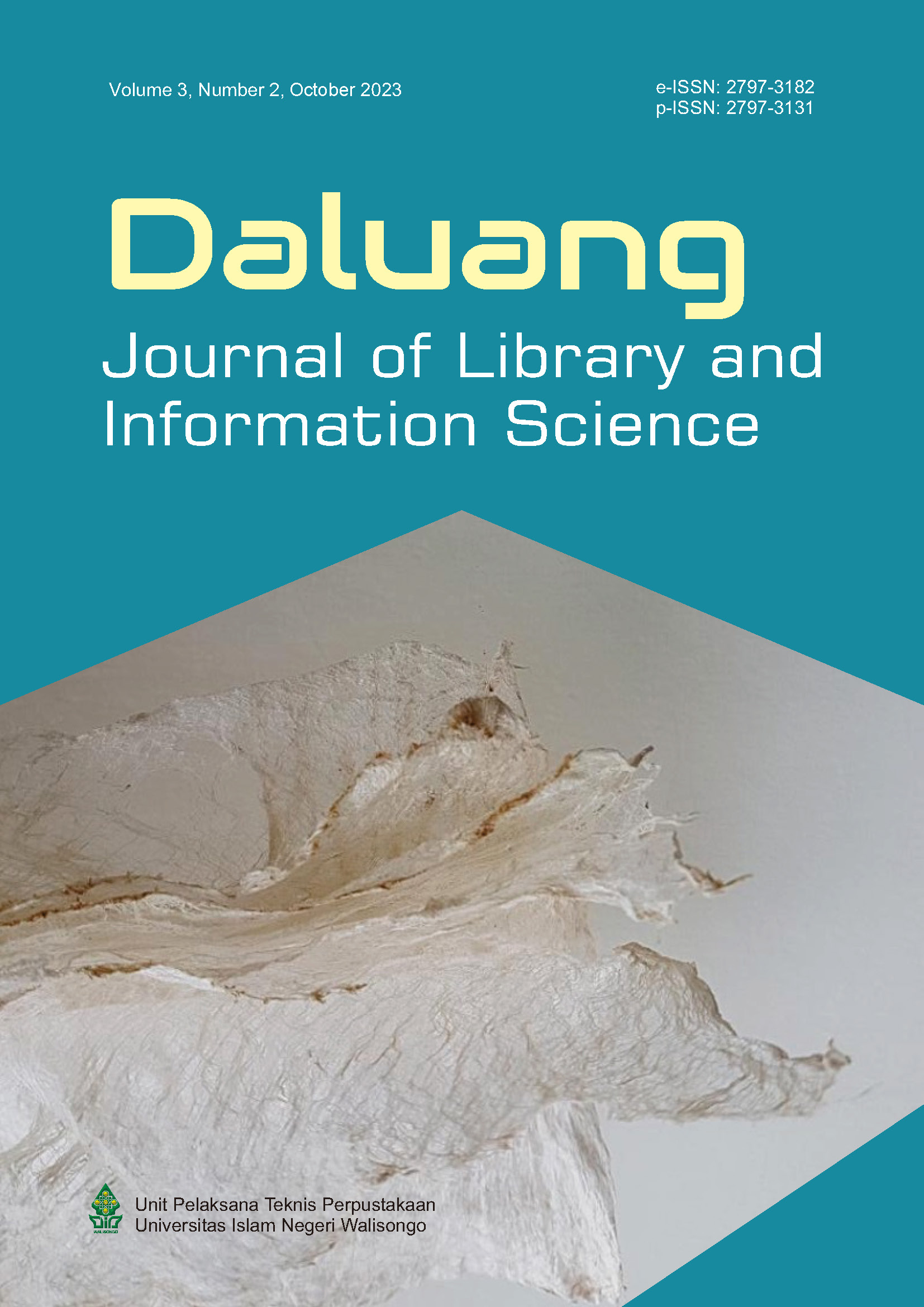Optimalisasi kolaborasi mahasiswa dengan instansi praktik dalam menentukan minat praktik kerja perpustakaan
Main Article Content
Abstract
Purpose. The purpose of this study is to obtain a description of the collaboration carried out by students participating in Library Internship Programs with the institutions where they undergo their internships.
Methodology. Using an online questionnaire as the instrument distributed to students participating in internships, responses were received from students from 127 provinces in Indonesia.
Results and discussion. The information gathered indicates that library internship activities already reflect a diversity of interests, competencies, and objectives as part of the library internship experience. There is alignment between the activities carried out and various aspects of library management, collection development, and the complexity of seeking career opportunities in the library field.
Conclusions. An analysis of the collaboration strategy between students and practical institutions in determining the type of library practice reveals several important aspects. Students must have a clear understanding of the learning objectives and library practice requirements through constructive dialogue with the practical institution. They also need to build a professional network and participate in activities that broaden their understanding of various types of practices. However, the lack of variety in the scope of practices suggests the need for guidance or alignment activities before the practical placement is carried out, allowing students to choose a practice type that aligns with their mentor's educational background.
Downloads
Article Details
This work is licensed under a Creative Commons Attribution-NonCommercial-NoDerivatives 4.0 International License.
Articles published in Daluang Journal of Library and information Science are available under Creative Commons Attribution Non-Commercial No Derivatives Licence (CC BY-NC-ND 4.0). Authors retain copyright in their work and grant Daluang Journal of Library and information Science right of first publication under CC BY-NC-ND 4.0. Users have the right to read, download, copy, distribute, print, search, or link to the full texts of articles in this journal, and to use them for any other lawful purpose.
Articles published in Daluang Journal of Library and information Science can be copied, communicated and shared in their published form for non-commercial purposes provided full attribution is given to the author and the journal. Authors are able to enter into separate, additional contractual arrangements for the non-exclusive distribution of the journal's published version of the work (e.g., post it to an institutional repository or publish it in a book), with an acknowledgment of its initial publication in this journal.
This copyright notice applies to articles published in Daluang Journal of Library and information Science volumes 1 onwards.
References
Albert, & Irmatita. (2018). Sistem informasi kerja praktik berbasis website untuk optimasi program kerja praktik pada Perpustakaan Nasional Republik Indonesia. Jurnal Sistem Informasi dan Aplikasi, 1(1), 89–100. https://ejournal.upnvj.ac.id/jsia/article/view/5909
Asif, M., & Singh, K. K. (2019). Emerging trends and technologies for digital transformation of libraries. IP Indian Journal of Library Science and Information Technology, 4(2), 41–43. https://doi.org/10.18231/j.ijlsit.2019.011
Bloor, M., & Wood, F. (2006). Purposive sampling. Keywords in Qualitative Methods, 09(1), 1–20. https://doi.org/10.4135/9781849209403.n73
Fatmawati, E. (2009). Peran perpustakaan perguruan tinggi dalam akreditasi jurusan/program Studi. Unilib Jurnal Perpustakaan, 2(1), 54–63.
Giese, H., Neth, H., & Gaissmaier, W. (2021). Determinants of information diffusion in online communication on vaccination: The benefits of visual displays. Vaccine, 39(43), 6407–6413. https://doi.org/10.1016/j.vaccine.2021.09.016
Hall-Ellis, S. D., & Grealy, D. S. (2013). The Dreyfus model of skill acquisition: A career development framework for succession planning and management in academic libraries. College and Research Libraries, 74(6), 587–603. https://doi.org/10.5860/crl12-349
Hannah, C. T. (2023). Early exposure to research data skills: A librarian engagement with a bioinformatics class (version 1). STEM Librarian South. https://doi.org/https://doi.org/10.6084/m9.figshare.23703648.v1
Kelly, K., Hoelscher, C., & Gauder, H. (2014). Results for resumes: Managing undergraduate library interns. Library Leadership and Management, 28(4), 1–18. https://doi.org/10.5860/llm.v28i4.7068
Komariah, N., Saepudin, E., & Nurislaminingsih, R. (2021). Kolaborasi sebagai upaya peningkatan kinerja perpustakaan di Telkom University Open Library. Pustakaloka, 13(2), 178–198. https://doi.org/10.21154/pustakaloka.v13i2.3285
Kurniasih, N. (2015). Kualifikasi pustakawan di era digital. Prosiding Semiloka Nasional Kepustakawanan Indonesia, August 2015, 439–449. https://doi.org/10.13140/RG.2.2.12045.54249
Maha, R. N., & Rosiyan, N. R. (2021). Inovasi e-layanan kepustakaan di Perpustakaan Lembaga Riset: Studi kasus pada Pusat Data dan Dokumentasi Ilmiah. Al-Ma’mun: Jurnal Kajian Kepustakawanan dan Informasi, 2(2), 84–93. https://doi.org/10.24090/jkki.v2i2.5252
Mochammad, R., MS, R. A., & Cahyono, T. Y. (2020). Library 4.0: Eco-blended library and library inclusion. Khizanah al-Hikmah: Jurnal Ilmu Perpustakaan, Informasi dan Kearsipan, 8(2), 116–129. https://doi.org/10.24252/kah.v8i2a2
Narendra, A. P. (2015). Data besar, data analysis, dan pengembangan kompetensi pustakawan. Record and Library Journal, 1(2), 83–93. https://e-journal.unair.ac.id/RLJ/article/download/7086/4255/21761
Nashihuddin, W., & Aulianto, D. R. (2016). Strategi peningkatan kompetensi dan profesionalisme pustakawan di perpustakaan khusus. Jurnal Perpustakaan Pertanian, 24(2), 51. https://doi.org/10.21082/jpp.v24n2.2015.p51-58
Nashihuddin, W., & Suryono, F. (2018). Tinjauan terhadap kesiapan pustakawan dalam menghadapi disrupsi profesi di era library 4.0: Sebuah literatur review. Khizanah al-Hikmah : Jurnal Ilmu Perpustakaan, Informasi, dan Kearsipan, 6(2), 86. https://doi.org/10.24252/kah.v6i2a1
Nurlia. (2018). Strategi pelayanan dengan konsep service excellent. Meraja Journal, 1(2), 17–30. https://doi.org/https://doi.org/10.33080/mrj.v1i2.9
Sembiring, M. G., Budiman, R., Krida, S. W., Arif, E., Fatimah, F., & Pratiwi, W. R. (2023). Bimbingan teknis pembuatan kuesioner untuk penelitian dosen pemula. Martabe: Jurnal Pengabdian kepada Masyarakat, 6(5), 1714–1721. http://jurnal.um-tapsel.ac.id/index.php/martabe/article/view/11210
Trope, A., Johnson, D. J., & Demetriades, S. (2021). Media, making & movement: Bridging media literacy and racial justice through critical media project. Journal of Media Literacy Education, 13(2), 43–54. https://doi.org/10.23860/JMLE-2021-13-2-4
Ulfah, H. R. (2020). Optimalisasi layanan perpustakaan di era new normal. Al-Ma’mun: Jurnal Kajian Kepustakawanan dan Informasi, 1(1), 32–41. https://doi.org/https://doi.org/10.24090/jkki.v1i1.4050
Untari, D. (2021). Pengembangan layanan data penelitian (research data services) di Perpustakaan Lembaga Penelitian = Development of research data services in Research Institute Libraries. 1st International Conference on Library and Information Sciences 2021: Library Trends in the Post Covid-19 Pandemic Era, 1–8.
Vieno, K., Rogers, K. A., & Campbell, N. (2022). Broadening the definition of ‘research skills’ to enhance students’ competence across undergraduate and master’s programs. Education Sciences, 12(10), 642. https://doi.org/10.3390/educsci12100642



